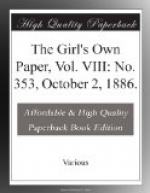It was true that I was getting the best of the argument, and yet I was sorry for Aunt Agatha. I felt how I was shocking all her notions of decorum and propriety, and giving pain to the kindest and gentlest heart in the world; but one cannot lead a new crusade without trampling on some prejudices. I knew all my little world would shriek “fie,” and “for shame” into my ears, and all because I was bent on working out a new theory. The argument had grown out of such a little thing. I had shown Aunt Agatha an advertisement in the Morning Post, and announced my intention of answering it in person the following morning.
“Nurse.—Can any lady recommend a thoroughly conscientious superior person to take charge of two children, baby eighteen months old? Assistance given in the nursery. Must be a good, plain needlewoman. Prince’s Gate, S.W.”
To the last day of my life I do not think that I shall ever forget Aunt Agatha’s face when she read that advertisement.
“You intend to offer yourself for this situation, Merle—to lose caste, and take your place among menials? It is enough to make my poor brother rise in his grave, and your poor, dear mother too, to think of a Fenton stooping to such degradation.” But I will forbear to transcribe all the wordy avalanche of lady-like invective that was hurled at me, accompanied by much wringing of hands.
And yet the whole thing lay in a nut-shell. I, Merle Fenton, sound, healthy, and aged two-and-twenty, being orphaned, penniless, and only possessing one near relative in the world—Aunt Agatha—declined utterly to be dependent for my daily bread and the clothes I wore on the goodwill of her husband and my uncle by marriage, Ezra Keith.
No, I was not good. I daresay I was self-willed, contradictory, and as obstinate as a mule that will go every way but the right way, but, all the same, I loved Aunt Agatha, my dead father’s only sister, and I detested Uncle Keith with a perfectly unreasonable detestation.
Aunt Agatha had been a governess all her life. Certainly the Fenton family had not much to boast of in the way of wealth. Pedigree and poverty are not altogether pleasant yoke fellows. It may be comfortable to one’s feelings to know that a certain progenitor of ours made boots at the time of the Conquest, though I am never quite sure in my mind that they had bootmakers then; but my historical knowledge was always defective. But a little money is also pleasant; indeed, if the pedigree and the money came wooing to me, and I had to choose between them—well, perhaps I had better hold my tongue on that subject; for what is the good of shocking people unless one has a very good reason for doing so?
My father’s pedigree did not help him into good practice, and he died young—a grave mistake, people tell me, for a professional man to commit. My mother was very pretty and very helpless, but then she had a pedigree, too, and, probably, that forbade her to soil her white hands. She was a fine lady, with more heart than head, which she had lost most unwisely to the handsome young doctor. After his death, she made futile efforts for her child’s sake, but the grinding wheel of poverty caught the poor butterfly and crushed her to death.




